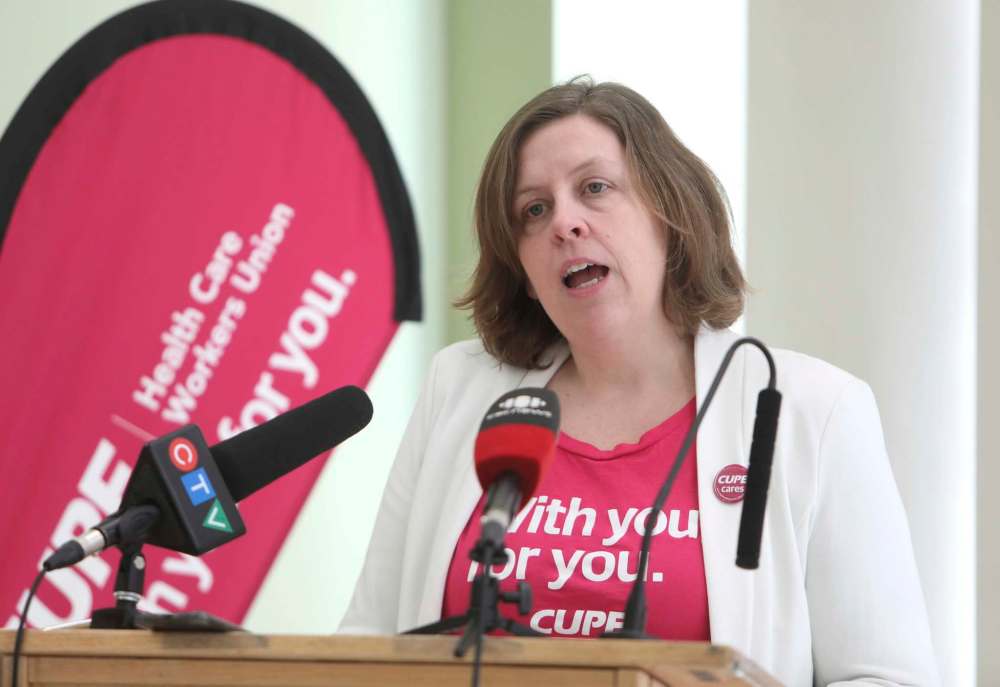CUPE bashes MGEU over health care contracts
Advertisement
Read this article for free:
or
Already have an account? Log in here »
To continue reading, please subscribe:
Monthly Digital Subscription
$1 per week for 24 weeks*
- Enjoy unlimited reading on winnipegfreepress.com
- Read the E-Edition, our digital replica newspaper
- Access News Break, our award-winning app
- Play interactive puzzles
*Billed as $4 plus GST every four weeks. Offer only available to new and qualified returning subscribers. Cancel any time.
Read unlimited articles for free today:
or
Already have an account? Log in here »
Hey there, time traveller!
This article was published 25/01/2019 (2230 days ago), so information in it may no longer be current.
In an extraordinary move, a large public-sector union called out another union Friday, accusing it of lying, fearmongering and needlessly frightening Manitoba health care workers.
The Canadian Union of Public Employees condemned assertions made by the Manitoba Government and General Employees’ Union on Thursday, that the Pallister government’s move to consolidate health bargaining units could lead to health care aides and home care workers being used interchangeably.
“We believe that’s a gross exaggeration of what that process would ever look like,” said Liz Carlyle, a CUPE national representative.

“We believe that this is really just fearmongering on MGEU’s behalf because they don’t want to answer for what’s in their collective agreements.”
Carlyle accused the MGEU of bargaining inferior contracts for its workers and failing to keep them informed about the latest developments in the government’s effort to reduce the number of health care bargaining units in Manitoba.
She said health care workers have known for months that health care aides might be put in the same bargaining unit as home care workers.
“Just being a member of the same bargaining unit does not mean that the employer can assign you to work someone else’s job or to work on another site,” Carlyle said.
She said CUPE agreements guarantee such protection for their members.
On Thursday, MGEU president Michelle Gawronsky said she’s been told government wants the flexibility to use workers and aides interchangeably.
“A good health-care system needs to support (its) health-care workforce, not stress them out and turn their lives upside down,” Gawronsky said then. “Only a high-priced consultant who isn’t working on the front lines would try to improve quality of care by shuffling health workers around the system.”
The rare public criticism of one union by another comes as the government is forcing health care unions to compete for members across the province. Where there are now 180 health bargaining units across the province, that will be reduced to about three dozen in the coming months.
The most intense competition will occur in the areas of facility support staff, community support workers and professional/technical/ paramedical staff.
Where currently, one union may represent health care aides in one hospital and another union may represent the same workers in a different hospital, soon run-off votes will be held to pick one union to represent all these workers across an entire health region.
On Thursday, the government announced that health care aides and home care workers would be placed in the same ‘community support’ category. That drew the ire of the MGEU, which represents all home care workers and some health care aides.
Sheila Gordon, the MGEU’s director of negotiations, said while the government had expressed a desire last fall to combine health care aides with home care workers in the same bargaining classification, it lacked the legal authority to do it — until this week when it passed a regulation allowing it.
The MGEU had hoped that home care workers would remain in their own bargaining category.
While CUPE accused the MGEU of frightening hospital and home care workers by raising the possibility they might be moved around and forced to do each other’s jobs, Gordon said that remains a real possibility the way the government is directing the bargaining units to be established.
Within the Winnipeg Regional Health Authority, for instance, all home care workers and health care aides would be in the same bargaining unit, represented by one union. All unions that represent any of these workers would vie for the right to represent them.
“The reality is that once workers are placed in the same bargaining unit, employers can and do reassign staff within that unit,” said Gordon. Since bargaining units are now generally site-specific, that’s not currently an issue, she said.
Rather than fearmongering, Gordon said, the MGEU felt it had an obligation to alert health workers to what may transpire as bargaining units are rationalized.
Health Minister Cameron Friesen said Thursday that the MGEU was incorrect in its assertion that creating larger bargaining units would lead to workers being shuffled around from facility to facility, or from a hospital or personal care home into providing home care.
“Staff will continue to have choice about where they work and what role they play in the system,” he said.
However, Gordon pointed out that a consultant hired by the Pallister government has argued that merging bargaining units would enhance the effective use and mobility of health care workers.
larry.kusch@freepress.mb.ca

Larry Kusch
Legislature reporter
Larry Kusch didn’t know what he wanted to do with his life until he attended a high school newspaper editor’s workshop in Regina in the summer of 1969 and listened to a university student speak glowingly about the journalism program at Carleton University in Ottawa.
Our newsroom depends on a growing audience of readers to power our journalism. If you are not a paid reader, please consider becoming a subscriber.
Our newsroom depends on its audience of readers to power our journalism. Thank you for your support.
History
Updated on Saturday, January 26, 2019 9:01 AM CST: Fixes reference to reduction in bargaining units.

